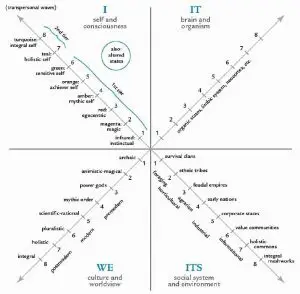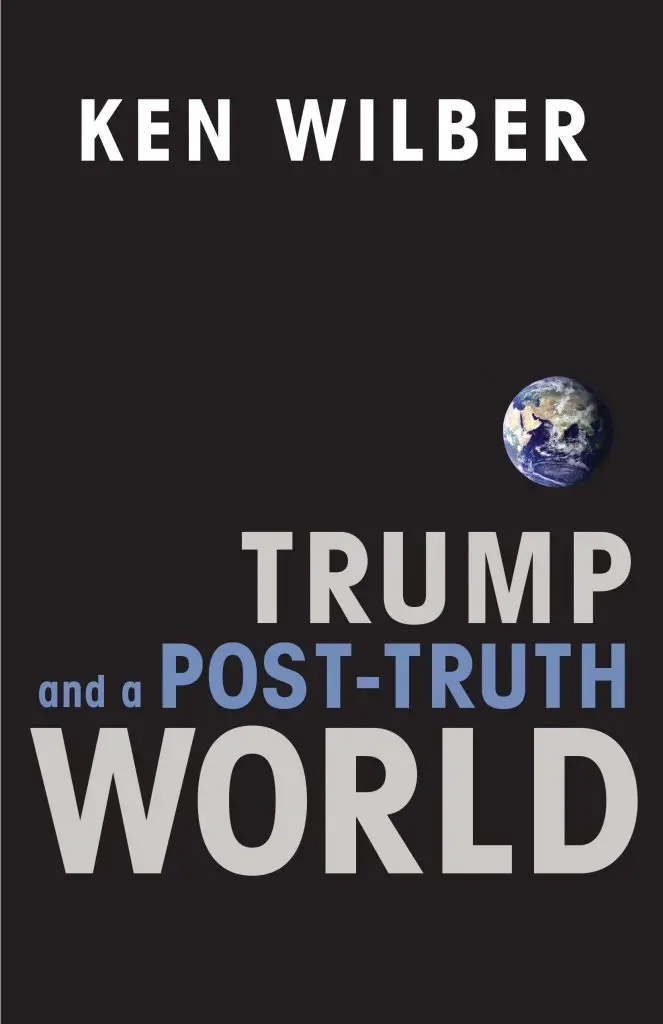“A country in which 50 percent of the population flat out hates the other 50 percent is not a country that can move forward with any sort of grace, dignity, and integrity. And that is exactly where the United States of America finds itself right now.”
Shock and surprise ran wild when the presidency was won by a reality television star who once made a bit-part cameo in Home Alone 2 . Ever since that fateful day, theorists have pitched a range of explanations as to how it happened.
Rampant racism and misogyny, media amplification, missteps by Clinton, widespread economic stress, The Emails, Russia—these are just a few of the hypotheses that have been proffered. But one thinker has a somewhat novel idea as to how and why it all went down.
In Trump and a Post-Truth World, writer, philosopher, and systems theorist Ken Wilber proposes a rather elaborate conception of “all of the above.” It wasn’t just racism’s fault, nor was it Clinton’s disenfranchisement of the “deplorables.” It was both of these and much more.
According to Wilber, the universe is to blame.
This is going to take some explaining.
The Growth Hierarchy of Evolution
Ken Wilber is the leading mind behind the Integral Theory movement, which strives to synthesize virtually all knowledge, experiences, and manifestation into a single, unified metatheory. He provides sweeping explanations of Integral Theory in his books Sex, Ecology, Spirituality, the much more accessible A Theory of Everything, and his most recent opus The Religion of Tomorrow, but for our purposes here I will attempt to provide a stripped down (and I mean right down to the barest of bones) overview.
Essentially, Wilber places all of existence within a four-quadrant grid that plots two axes of experience: interior-exterior and individual-collective. His theory asserts that individuals, cultures, social systems, and indeed everything else develops along these growth hierarchies.

For example, as a human matures it develops through a series of internal stages. A baby knows only survival impulses, then as a toddler it knows only its ego. From there it learns to appreciate its narrow social group. It transcends this to become an individual with a global perspective beyond the social group, before learning to recognize the perspectives of all individuals on a multicultural scale. To simplify this further, egocentric becomes ethnocentric becomes worldcentric.
Societies work this way too. For example, ethnocentric, religious, and authoritarian empires and monarchies (which made citizens subservient to the egos of those in power) gave way to democracies that championed individual rights (think of the French and American Revolutions), which have over the past 60 years or so transformed into a radical relativism that emphasizes unique subjective, contextual realities (think how the Civil Rights Movement and cultural revolution of the 1960s deepened and expanded upon the American Founding Fathers’ concepts of self-determination and individual freedom).
Acorn became sapling became oak. Or in our case, traditional (religious, authoritarian, ethnocentric) became modern (science, rationality, global business, individualistic) became post-modern (context-based multiculturalism).
And according to Wilber, “The well-recognized battle between these three value systems is everywhere referred to as ‘the culture wars.’”
Now it must be pointed out that Wilber emphasizes how none of these stages are “better” or “worse” than the others. They are simply rungs of development that all people have the potential to experience. If there is any “value” that can be placed on one above another, it’s solely in the fact that with each higher level a person gains a more inclusive perspective.
An oak is not “better” than the acorn from which it grew, but you can certainly get a more expansive view from its branches.
It’s also important to mention that not everyone, and in fact, very few people develop to upper realms of this spectrum. Most people take a position and stay there rather than moving on. This happens for any number of reasons. Few seeds sprout, only a handful of those that do grow any further, and even fewer of these bear fruit.
And the development of cultures can be assessed by the proportions of its population that can be attributed to these stages. According to developmental researchers, the vast majority of the current world population is ethnocentric. The American Revolution didn’t happen until it had a sizable enough group of modern-individualists to provide a “leading edge” toward development. Then later the Civil Rights Movement only occurred when enough people tugged us post-modern.
This, says Wilber, is the nature of our individual interior and collective social evolutions. And we are all along for the ride.
Where We’re At Today
It’s rather clear to see where different factions of U.S. society fall on this hierarchy.
Trump and Co. revel in their traditional ethnocentricism: protect our little group at all costs—with a wall if necessary. Wilber has color-coded them as “red/amber.”
The Clintons and Bushes of the world are modernists: the rights of the individual supersede all considerations—unless it gets in the way of business, because the benefits of business can be rationalized above all else. Integral Theory calls them “orange.”
And Bernie represents the post-modernists: nothing is more important than individual and cultural context—there is no truth but my own truth. These are the “greens.”
Now we’re all watching the war between these three camps play out.
Ostensibly, according to Wilber, evolution has been pushing us all forward toward post-modernism, which will subsequently give way to a more harmonious integrative tier of society. But evolution has hit a snag—the post-modernists have taken their (and if I’m going to be honest, my) view too far, and in doing so they’ve pissed everyone off. Evolution included.
As a result, evolution has been forced to take a step back before it can progress again. But I’m getting ahead of myself.
Before we can get to where Trump fits into all this, we have to understand where post-modernist green went wrong.
Aperspective Madness: Narcissism and Nihilism
According to Wilber, the post-modernists have wandered astray for many reasons, but he chalks the central issue with their stance up to what he calls “aperspective madness.”

At the core of the post-modernist belief—at least theoretically speaking—are the assertions that one’s own “truth” trumps (no pun intended) all other external impositions, and that facts are entirely contextual. Taken to extremes, these views elevate narcissism (no truth but my own) and nihilism (no-truth at all) above all else: “a culture of post-truth.”
“Teaching that ‘no truth’ idea in an ivory tower,” Wilber points out, “divorced from any practical reality, to unsuspecting college students is one thing; seeing it in real action is quite another.”
In the real world where most people are living at an egocentric/ethnocentric level of development, is it any surprise that green’s “post-truth” theories would be misapplied? That instead of seeking multicultural applications for these concepts, they would rally behind the king of narcissism and nihilism?
“…the one thing that was true of Donald Trump—more than any other single characteristic that defined him (more than his sexism, more than his racism, more than his xenophobia)—is that every word out of his mouth was anti-green.”
On one hand the ethnocentrists might have been latching onto and misusing post-modernist ideals, while on the other they were most certainly sick of post-modernist attitude.
Superiority Complex
Wilber asserts that green post-modernists have fallen into an unfortunate trap of bad logic:
“They believed all knowledge is interpretive, except for theirs, which is solidly given and accurately describes conditions everywhere. They believed their view itself is utterly superior in a world where they also believed absolutely nothing is superior. Oops.”
In other words, greens have gone about shouting that there is no truth except for the fact that there is no truth. No view is better than any other view except their view, which is the right one. If that sounds contradictory, that’s because it is. Green judges just as fast as they say we should abhor any and all judgement.
“…green multiculturalism has an intense and absolutely believed judgment that worldcentric all-inclusive views are categorically better than ethnocentric power-driven and oppressive views—but it also has an overriding belief that judgments themselves are inherently oppressive and evil…”
And while the quest to implement multiculturalism is most certainly an admirable one, problems arise when green misidentifies the circumstances under which it is questing. Green seems utterly confounded by the fact that ethnocentric red doesn’t agree with it pluralistic intentions:
“…it simply looks at their exteriors, at their behavior, and wants each and every person to be free of judgment, ranking, oppression, domination, coercion, or control by any others. Now unfortunately, what it does not do is take into account the interior realities of each of those individuals, and see which of those individuals are actually in favor of that goal of equality. Because as it turns out, the majority of individuals are not in favor of that worldcentric goal.”
Most people simply have not developed to the point where they can even comprehend pluralism. The acorn can’t understand how the oak experiences the world.
As a result, “call-out culture” arose as post-modern multiculturalists attempted to shame bewildered ethnocentrists into accepting a pluralist worldview, the latter of which were fundamentally not equipped to understand the reasoning behind the shaming.
“The cultural belief was that everybody is created equal, that all people have a perfect and equal right to full personal empowerment, that nobody is intrinsically superior to anybody else (beliefs that flourished with green). Yet the overwhelming reality was increasingly one of a stark and rapidly growing inequality—in terms of income and overall worth, property ownership, employment opportunity, healthcare access, and life satisfaction issues… Everywhere you are told that you are fully equal and deserve immediate and complete empowerment, yet everywhere are denied the means to actually achieve it. You suffocate, you suffer, and you get very, very mad.”
Armed with post-truth ideas beyond their grasp, attacked for behaviors they’d never questioned (and remember that from an ethnocentric standpoint, white supremacy or some other form of us vs. them prejudice is to be expected–your group matters above all else, after all), and battered by a broken social system, it’s no wonder that these ethnocentric masses turned to someone like Trump.

Correcting Evolution
Wilber is not arguing that this is a good thing. He is, however, saying that this poses an opportunity. According to his thinking, evolution is taking a step back and, in a sense, allowing post-modern greens to self-reflect and seize upon the chance for genuine leadership.
As Wilber points out, within days of Trump’s election greens everywhere were realizing the folly of uninhibited no-truth. “Truth is more important now than ever,” declared the New York Times.
Wilber claims that now is the time for green to abandon “no-truth” and posit the idea that pluralism is in fact “better” than ethnocentricism. And to do this effectively, they must use leadership that guides rather than shames.
To accomplish this, Wilber advises that we establish a “deliberately developmental culture.” He provides a range of specific prescriptions that will further this goal, but here are a few highlights:
- Orange modernists must embrace universal basic income in a way that provides for the material and internal needs of all. Physical, material, and emotional security supports evolution.
- Green post-modernists need to pay more attention to healing their own issues.
- Aperspective madness must be abandoned. Emphasis on no-truth needs to give way to the value of plurality.
- Green must develop an awareness of the downsides of hypersensitivity. Wilber says we’ll know this has been achieved when the great comedians start performing at universities again.
- Green must learn to embrace and love enthnocentric amber while not sanctioning their negative behaviors. They are not “deplorable” – they’re human beings in need of education, growth, and leadership.
According to Wilber, green post-modernists are right in asserting the value of multiculturalism. The problem arises when they attempt to shame or even criminalize the racist, misogynist, and generally ethnocentric external behaviors of Trump supporters without attending to the interiors that motivate them.
“…the healthy, correct, just reaction to such realities is an attitude of outreach, of embrace, of compassion and care.”





